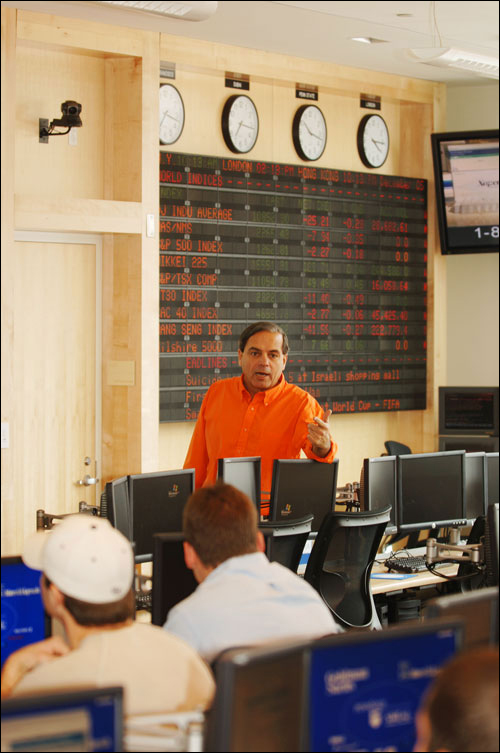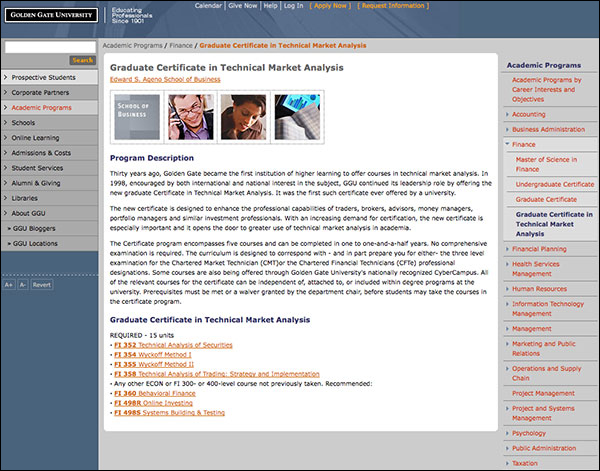
HOT TOPICS LIST
- Strategies
- Stocks
- Buy
- Investing
- Brokers
- Psychology
- Interviews
- Accumulate
- Sell
- Hold
- Spotlight
- Websites
- Candlestick Corner
- Gold & Metals
- Options Trading
LIST OF TOPICS
RESEARCH
A Formal Education In Trading
07/01/10 10:51:34 AM PSTby Karen Wasserman
Is it possible to get a degree in trading? Here are some opportunities to pursue degrees or certificates in finance or trading-related disciplines. We'll also look at some university facilities geared toward instruction in trading.
| Sometimes learning on the fly isn't prudent when there's real money at stake. A little training to prevent disaster might be in order, and for some, even a formal education might be desirable. Learning to trade well and profitably takes time and practice, but the trial-and-error trajectory can be shortened with some professional guidance. Opportunities are available for learning more about how to trade, invest, and analyze securities. Among them are seminars; training centers and prop firms; brokerage demos and brokerage training programs; tutors or mentors; practice software or paper trading; trading books and blogs; not to mention universities. For those looking to hit campus either personally or virtually, here are some college and university programs (especially those with on-campus trading labs or with concentrations in practical trading subjects) with a brief rundown of what they offer -- starting with the first place most people think of when it comes to trading and finance: New York. New York Institute of Finance According to NYIF's mission statement, its courses "combine academic rigor with an in-depth understanding of how business and finance work in the real world." All aspects of finance are covered here, including programs in technical analysis and trading, all divided into beginning, intermediate, and advanced course levels. Besides its headquarters in midtown Manhattan, there are additional NYIF classrooms in venues from Chicago to San Francisco to St. Petersburg, FL. Virtual classrooms are also available for home study. Sample courses in NYIF's program of studies on trading include:
An Introduction to Commodity Trading Sample courses in NYIF's technical analysis program of studies include:
CMT Examination Preparation/Technical Analysis
New York University |
Sample courses at NYU leading to a finance undergraduate degree include:Foundations of Financial Markets
Pace University As a student, you can also help manage a $250,000 university-sponsored portfolio through the Student Managed Investment Portfolio upon acceptance into this program. Students research individual companies and recommend purchases and sales. The class then votes on the recommendation. This is intended to prepare the student for a career in equity analysis or simply give the student the opportunity to apply real-world knowledge toward investment decisions. A competition against 300 other students puts your knowledge to the test, as does a place on the Lubin team in the Investment Research Challenge sponsored by the New York Society of Security Analysts. Finally, Pace's Center for the Study of Equity Markets sponsors faculty and student research on US and international securities market problems.
University of Toronto, Rotman School of Management Study topics such as derivatives, portfolio management and trading risks, financial statement analysis, investing, and risk management. Trading lab The RPM and RIT applications are also licensed to other schools for use in their trading labs. Feeling flush with all that knowledge? Consider participating in the annual trading competition (http://www.rotman.utoronto.ca/finance/lab/competitions-itc10-home.asp) to show off what you've learned. Compete against other students from universities worldwide in a three-day event in downtown Toronto. Simulated trading cases mimic different aspects of real-world markets and prepare students to make effective financial decisions taking account of uncertainty about the future.
MIT Sloan School of Management Here at Sloan, students combine studies in economics, finance, and accounting, and they also incorporate a special focus on mathematics, statistics, operations research, computer science, and engineering as it ties in to finance. |
| Trading lab http://mitsloan.mit.edu/finance/stl.php Opened in 1996, the MIT Sloan Trading Lab was the first ever built on a university campus. The lab was designed to be like the trading rooms found in the real world. An electronic tickertape carries price information from multiple markets, covering all 300,000 financial instruments worldwide; news and other financial information is fed from Reuters; and 23 trading stations await students to help them gain hands-on experience in trading and finance. The lab is also intended to be a research facility. As with other research centers at MIT, cross-disciplinary collaboration is encouraged. Some research projects in the pipeline include developing visualization techniques for representing complex portfolios; studies on the psychology of financial markets and how human behavior influences trading decisions; and computational techniques that incorporate artificial intelligence and neural network theory in order to evaluate and learn from past market experience. See our interview with Andrew Lo, professor of finance and director of the Laboratory for Financial Engineering at the MIT Sloan School of Management in the April 2009 STOCKS & COMMODITIES, http://www.traders.com/Documentation/FEEDbk_docs/2009/04/Interview.html and http://traderscom.stores.yahoo.net/stcov274anlo.html.
University of Pennsylvania Trading lab
The Pennsylvania State University Students pursuing a doctoral degree in finance can expect to spend about two years in formal course work including finance, economics, and statistics, and about three more years completing a dissertation. Penn State reports that about 80% of their doctoral students in finance find jobs as faculty at colleges and universities, while the other graduates have found positions in consulting, research institutes, or government agencies including the Securities and Exchange Commission. Trading lab Inside the lab, televisions offer access to live coverage of CNBC, CNN, and other financial and news networks, and real-time tickers and stock boards announce important financial information. Each of the 54 workstations is equipped with two monitors and a computer with simulated trading software for deal capture, settlement, analytics, pricing, portfolio management, derivatives pricing, and other finance-related challenges. Software access includes Bloomberg Professional, FactSet, Morningstar Direct, TradeStation, and Rotman Interactive Trader/Rotman Portfolio Manager simulation systems developed by the Rotman School of Business at the University of Toronto. |
 THE TRADING ROOM AT PENN STATE University of Illinois Trading lab
Northern Michigan University Trading lab When not used by students, the trading lab is available to the local business and educational community for instructional and training purposes.
Florida Atlantic University The eSignal trading platform is a trading analytics and market data platform used by professional traders. The FTS trading platform combines both academic and real-world trading applications to provide a practical approach using real-time data. The trading room has three areas. On the first floor, there are 25 computer workstations; a ticker with live market data; applications such as Bloomberg, Telerate, and FTS Reuters; and an LCD panel with a satellite television feed make up the equipment. On the second floor, you'll find 24 additional dual-screen computer workstations, an audio and video connection to the trading room below, and an overlook window. A server room located behind the main training room permits faculty to instantly deploy specialized desktops to meet the needs of a variety of business disciplines. These facilities were designed to help students learn financial market principles and develop trading techniques. Research databases allow historical analysis and backtesting, while live datafeeds support strategic decisions. Students engage in realistic case exercises and simulations. Trader Talk Series Students learn about trading techniques and strategies used to make money; tactics of successful traders; takes on the current market outlook from active traders; and the latest risk-management techniques used by traders today. On the list of topics to be addressed in the Spring 2010 FAU Trader Talk Series is: technical analysis & trading, and fundamental analysis & trading.
Texas State University Trading lab Incidentally, the University of Texas at Austin (http://www.utexas.edu) also has a trading lab and can also boast about being one of the first college campuses in the country to have one. The EDS Financial Trading and Technology Center in the McCombs School of Business (http://www.edscenter.utexas.edu/), installed way back in 1996 initially as a simulation trading room and technology showcase, also led the way for other study centers in the school that bring the lessons of the outside world onto campus, including a real estate finance center and an energy finance center, as well as others. At the EDS center, audiovisual and distance learning systems are integrated into a three-room complex. Faculty and students have access to real-time datafeeds including Bloomberg, FactSet, Capital IQ, Morningstar, and Argus. These dataflows are used by undergraduate and graduate students in a variety of classes ranging from finance classes on portfolio management to information-impact management courses on the financial applications of information technology. The center also supports teaching, research, and community outreach programs. Golden Gate University The curriculum prepares the student for either the Chartered Market Technician (CMT) examination or the Chartered Financial Technicians (CFTe) examination. Want to pursue this line of study without the commute? Some courses are also offered through GGU's CyberCampus. Certificate courses can be combined with degree programs at the university. Prerequisites must be met or a waiver granted by the department chair before students may take the courses in the certificate program. Henry Pruden, PhD (interviewed in the September 2007 Technical Analysis of STOCKS & COMMODITIES magazine (http://www.traders.com/Documentation/FEEDbk_docs/2007/09/Interview/interview.html), professor of business and executive director of the Institute of Technical Market Analysis (ITMA) at GGU, has been teaching for more than 30 years and trading for more than 20. He is also president of the Technical Securities Analysts Association of San Francisco. Pruden says of the program: "Golden Gate University is recognized around the globe as a pioneer and a leader in technical analysis education for traders. Starting in 1976 with the first-ever graduate course in technical analysis at an accredited university, the curriculum grew to meet the needs of practitioner-students. Courses and instructors were added in systems building and testing, trader psychology, and behavioral finance. Moreover, the Wyckoff method of technical trading is alive and well at Golden Gate." Sample courses in GGU's graduate certificate program in technical market analysis: Technical Analysis of Securities
GGU also offers a master's of science degree in finance. It covers corporate finance, investments, and capital markets, plus courses in financial analysis and financial modeling to build on the student's background in accounting and computer applications. |
 GGU'S GRADUATE CERTIFICATE IN TECHNICAL MARKET ANALYSIS IN CONCLUSION REFERENCE AND RESOURCE
|
Karen Wasserman can be reached at KWasserman@traders.com
| Charting the Stock Market: The Wyckoff Method -- Books | |
| Working-Money.com -- Online Trading Services | |
| Traders.com Advantage -- Online Trading Services | |
| Technical Analysis of Stocks & Commodities -- Publications and Newsletters | |
| Working Money, at Working-Money.com -- Publications and Newsletters | |
| Traders.com Advantage -- Publications and Newsletters | |
| Professional Traders Starter Kit -- Software | |
PRINT THIS ARTICLE

Request Information From Our Sponsors
- VectorVest, Inc.
- Executive Premier Workshop
- One-Day Options Course
- OptionsPro
- Retirement Income Workshop
- Sure-Fire Trading Systems (VectorVest, Inc.)
- Trading as a Business Workshop
- VectorVest 7 EOD
- VectorVest 7 RealTime/IntraDay
- VectorVest AutoTester
- VectorVest Educational Services
- VectorVest OnLine
- VectorVest Options Analyzer
- VectorVest ProGraphics v6.0
- VectorVest ProTrader 7
- VectorVest RealTime Derby Tool
- VectorVest Simulator
- VectorVest Variator
- VectorVest Watchdog
- StockCharts.com, Inc.
- Candle Patterns
- Candlestick Charting Explained
- Intermarket Technical Analysis
- John Murphy on Chart Analysis
- John Murphy's Chart Pattern Recognition
- John Murphy's Market Message
- MurphyExplainsMarketAnalysis-Intermarket Analysis
- MurphyExplainsMarketAnalysis-Visual Analysis
- StockCharts.com
- Technical Analysis of the Financial Markets
- The Visual Investor
